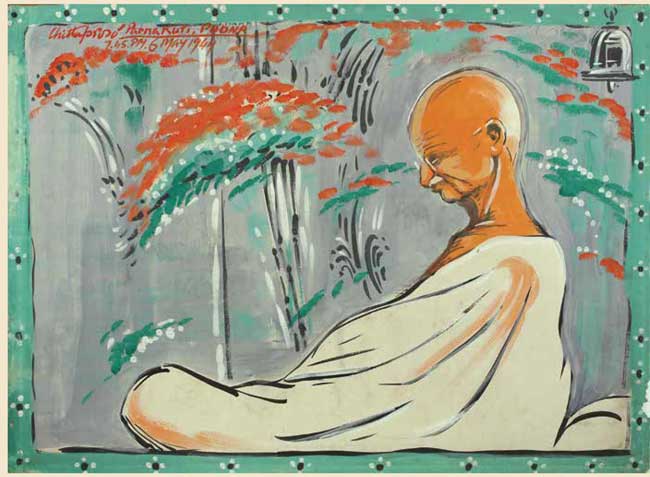The Dhebar commission (1960) and the Shilu Ao (1969) team recommended the Government of India that primitive tribal communities should be taken as a special category for which special programmes would have to be initiated as quickly as possible for their all-round development. (Sibi Zacharias, 2003). As part of tribal sub plan, seventy five tribal groups have been categorised as ‘Particularly Vulnerable Tribal Groups’ (PVTG) in India. The main criteria adopted for identification of such tribe are: (i) Pre- agricultural level of technology, (ii) Very low level of literacy, and (iii) Stagnant or declining population. As these tribes are in a very poor state of economy, a separate special Central assistance is provided to the state for their development. Total primitive tribal population in India is 27, 68322 and in Kerala is 20,186 (2001 Census).
Source: Role of gender and social capital in sustainable livelihood promotion of Kadar tribe in Kerala; PhD thesis by Sujeesh, M.K, The Gandhigram Rural Institute, 2014, Introduction, p. 4
URL: http://hdl.handle.net/10603/186310
Date visited: 25 April 2021
“Gandhi’s logic and rationale were irrefutable. Colonialism had impoverished and killed India’s poor. This was literally true, for countless millions had died in famines which had started as a drought but became mass-killers because of merciless taxation and exploitation. Freedom from British rule meant nothing if it did not liberate Indians from hunger and give them an improved life. A leader had to identify completely with the poor, not through the easy means of a sermon but by sacrificing comfort and forsaking the temptations of money. This was the minimum, non-negotiable condition.”
Source: “The Rediscovery of Nehru: How Nehruvians revised their idol” by MJ Akbar (OpenTheMagazine.com, 13 August 2021)
URL: https://openthemagazine.com/cover-stories/the-rediscovery-of-nehru/
Date Visited: 3 October 2021
On India’s 73rd Independence Day, we need to grapple with the shameful fact that over one-third of the world’s malnourished live in India. In Outlook this week, our I-Day special cover story asks- what about azadi from hunger?
Poshan #OutlookThisWeek
Posted: Aug 15, 2019 on https://youtu.be/WWjM5xTGOps >>
Follow this story and more: https://www.outlookindia.com/
Discussing the challenge ahead for millions of India in the foreseeable future:
How to bring down the rate of stunting and wasting to single digit rates? [5:35] >>
[Bold typeface added above for emphasis]
Up-to-date reports by Indian journalists and commentators
To search Indian periodicals, magazines, web portals and other sources safely, click here. To find an Indian PhD thesis on a particular tribal community, region and related issues, click here >>
Search tips
Combine the name of any particular state, language or region with that of any tribal (Adivasi) community.
Add keywords of special interest (music, poetry, dance just as health, sacred grove and biodiversity); learn about the rights of Scheduled Tribes such as the “Forest Rights Act” (FRA); and the United Nations “Declaration on the Rights of Indigenous Peoples”, “Universal Declaration of Human Rights”, “women’s rights”, or “children’s right to education”.
Specify any other issue or news item you want to learn more about (biodiversity, bonded labour and human trafficking, climate change, ecology, economic development, ethnobotany, ethnomedicine, global warming, hunter-gatherers in a particular region or state, prevention of rural poverty, water access).
For official figures include “scheduled tribe ST” along with a union state or region: e.g. “Chhattisgarh ST community”, “Himalayan tribe”, “Scheduled tribe Tamil Nadu census”, “ST Kerala census”, “Particularly Vulnerable Tribal Group Jharkhand”, “PVTG Rajasthan”, “Adivasi ST Kerala”, “Adibasi ST West Bengal” etc.
In case the Google Custom Search window is not displayed here try the following: (1) toggle between “Reader” and regular viewing; (2) in your browser’s Security settings select “Enable JavaScript” | More tips >>
Note: hyperlinks and quotes are meant for fact-checking and information purposes only | Disclaimer >>
“We shall first have to give up this hubris of considering tribes backward. Every tribe has a rich and living cultural tradition and we must respect them.” – Vice President M. Venkaiah Naidu on the constitutional obligation to respect the cultural traditions of India’s tribal communities

Gandhian social movement | Constitution | Adverse inclusion >>
“Air is free to all but if it is polluted it harms our health… Next comes water… From now on we must take up the effort to secure water. Councillors are servants of the people and we have a right to question them.” – Mohandas K. Gandhi, Ahmedabad address on 1 January 1918; quoted by his grandson, Gopalkrishna Gandhi, in “On another New Year’s Day: Mahatma Gandhi’s ‘khorak’ a 100 years ago” (The Hindu, 1 January 2018)
“The world has enough for everyone’s need but not for anyone’s greed.” – Mahatma Gandhi quoted by Medha Patkar and Baba Amte (Narmada Bachao Andolan)
Find publications by reputed authors (add “open access” for freely downloadable content)
PDF-repository: texts quoted & further reference (Google Drive) >>
Learn more
Accountability | Constitution and Supreme Court | Democracy
Adivasi (Adibasi) | Scheduled Tribes (ST) | Classifications in different states | Tribal Research Institutes
Adverse inclusion | Casteism | Imprisonment | Social conventions
Ambedkar | He who does not lead his life under the direction of others … is a free man
Anthropology | Anthropological Survey of India (AnSI)
Biodiversity | Hyderabad biodiversity pledge
Childhood | Childrens rights: UNICEF India | Safe search
Climate change | United Nations on climate change
Colonial policies | Denotified Tribe vs. “criminal tribe“
eBook | Background guide for education
eBook | Demographic Status of Scheduled Tribe Population of India (Census figures 2011)
Ekalavya and Drona shape collective expectations from a teacher and a student
Fact checking | Figures, census and other statistics
Health and nutrition | Recommendations by the Expert Committee
How many ‘Scheduled Tribes’ are there in India? | Latest list (ST): tribal.nic.in (Govt. of India)
Human Rights Commission (posts) | www.nhrc.nic.in (Government of India)
National Commission for Scheduled Tribes
News update in Indian periodicals: Tribal Affairs
Nomadic and Semi-Nomadic Tribes | SEED – Government scheme